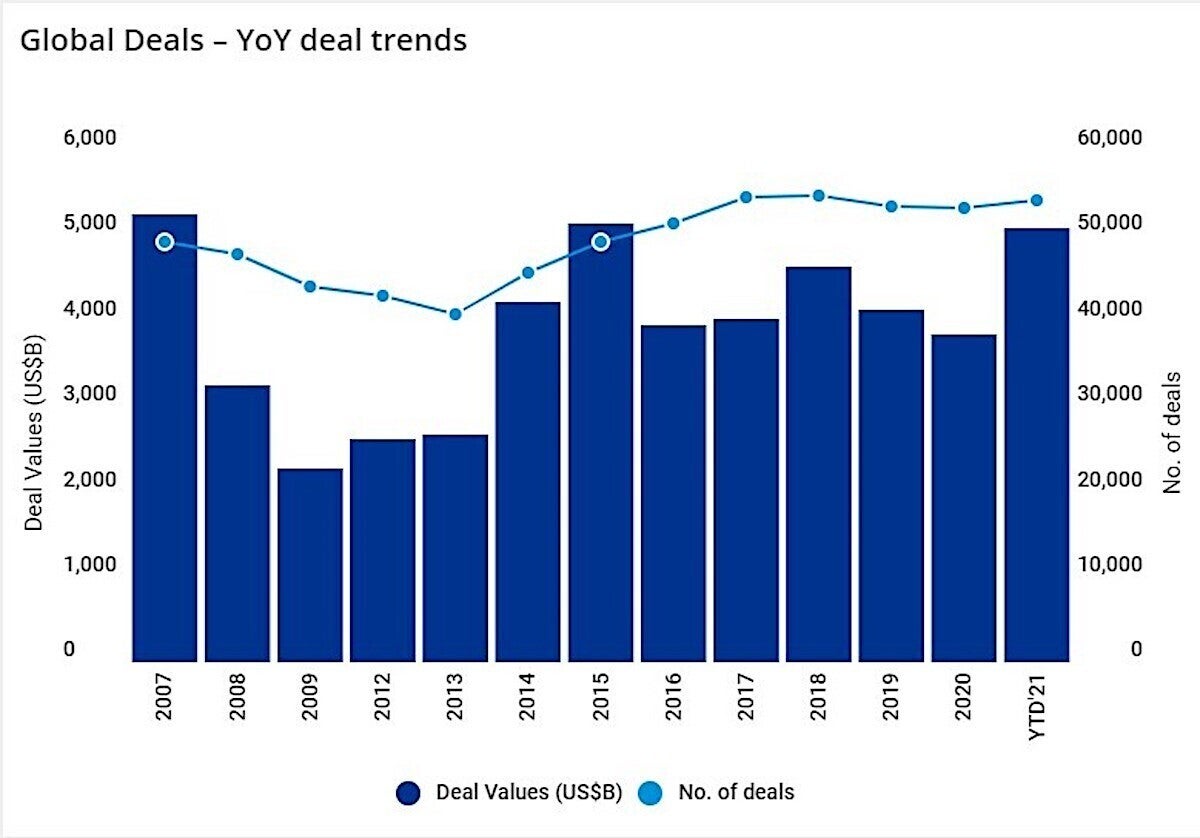Global mergers and acquisitions (M&As) last year surpassed pre-pandemic levels and nearly matched the previous record years of 2007 and 2015, according to professional services firm KPMG. This year, they’re poised to climb higher.
A KPMG survey of more than 350 US business indicated that mergers are on the rise because of easy access to capital, low interest rates, and a recovering global economy.
 KPMG
KPMGThe number of global mergers and acquisitions could climb higher this year than in 2021.
For managers and other employees, M&As bring uncertainty. The history of the acquiring company can sometimes indicate what’s coming: whether it tends to leave its acquisitions alone or typically combines operations, which can result in significant changes, including staff cuts.
While a new CIO, a new company culture, and new product roadmaps can mean daunting changes, when managed correctly, they can lead to opportunities for IT employees careers. That’s more important than ever now, with employees quitting jobs in record numbers for a multitude or reasons.
Last year, multinational Fintech firm Sovos Compliance LLC bought out seven companies. Sovos has more than 2,000 employees in 11 countries, and 20,000 customers (including half the Fortune 500) that operate in more than 70 countries.
 Sovos
SovosSovos’ Chief Talent Officer Colleen Schlagel.
Sovos’ Chief Talent Officer Colleen Schlagel said acquisitions are often the fastest route for a company to deliver new capabilities; at the same time, employees of the acquired company face big cultural changes.
Virginia Costa, a software engineer by trade, was employed by Convey Compliance Systems as a general manager in Tucuman (TUC), a province in the north of Argentina, when it was acquired by Sovos in 2014. She had been in charge of building out Convey’s development center of excellence in TUC to partner with the existing development team in Minnesota. At that time, the team in Tucuman consisted of about 60 employees, but most of the business knowledge was still in Minnesota, so it was critical, she said, to build a cohesive team between the two locations.
 Virginia Costa
Virginia CostaVirginia Costa, managing director, Latin America Development at Sovos.
Computerworld spoke with Schlagel and Costa to get insights on navigating an IT career during and after an acquisition. The following are edited portions of those interviews:
What was behind Sovos’ seven acquisitions in 2021? [Schlagel] “M&A has always been, and will continue to be, part of Sovos’ strategic business planning. Often times, acquisition is the quickest point to delivering new capabilities when and where they are needed most.”
What was most difficult about the acquisition by Sovos, and where did you end up initially at the company? [Costa] “To me, the most difficult part was helping our team navigate through the uncertainty, making sure that I brought peace of mind to the staff, explaining that there was nothing to be afraid of and if anything, this was a new source of opportunities to continue growing and showing our value.
“I recall the first time that [Sovos’] CEO visited our office in TUC. I introduced him to our team, and I focused on showcasing our amazing set of values. I was convinced that our culture and core values were a great add to the larger organization, and that we had lots of best practices to share and enrich the culture and our organization (which I’m proud to say is what ended up happening).”
How do acquisitions affect the career of IT workers, including executives? [Schlagel] “The biggest impact for employees is often the culture change of coming from a smaller company to being immersed in a larger multi-cultural global organization. The benefits to workers at the acquired company are plentiful. They frequently have access to benefits and programs not previously available and the opportunity to take their careers in new directions…. I can speak to this from personal experience as I came into Sovos through acquisition and went on to become the chief talent officer for the company.”
In what ways were you concerned about your position during the acquisition? [Costa] “As much as I tried to be rational about it, I had concerns at some points — not just about myself and my role, but also about my team. I feel this is natural, since we always tend to resist change. In this regard, I was very lucky to have awesome leaders who empowered me and gave me a ton of confidence.”
How did you achieve career growth when it could have gone the other way (and often does after acquisitions)? [Costa] “In my case, the acquisition opened the possibilities to manage teams across other countries, define a set of good practices, and iterate around them — learning from other acquisitions and improving ourselves in each iteration. It was fundamental in my case to quickly realize the fact that as we merge into a larger, multinational company, there were going to be tons of opportunities for those willing to take on challenges and show passion. For example, the acquisition opened the door for me to manage teams in other countries. And I found a great way to add value by defining a set of good practices and helping new members of Sovos come on board more quickly and successfully, but at the same time also stay alert to spot great practices and good ideas that other companies that merged into Sovos brought to the mix.”
What advice can you give others who find themselves at a company being acquired? [Costa] “My advice would be to build trust with your leaders, both ways. Learn to trust them, and work very hard to earn their trust. Also be transparent with your thoughts and your vision, don’t keep it to yourself. Finally, and most important, be ready to manage your team through uncertainty, and keep your perspective broad, always willing to learn new ways to do things. Like captains of a ship in a storm, our teams look up to us to understand the situation, and if we can keep calm and positive it is much more likely that the merge will be smooth and successful.”
What’s the best advice you’d give an IT manager or technology worker when it comes to improving their opportunities? [Schlagel] “Don’t limit yourself. When you come into a new organization, don’t be confined by your job description. Seek out opportunities within the organization to get involved. Whether it’s a technology team focused on a specific deliverable or a charitable committee looking to serve the interests of the community, put yourself out there, get to know colleagues outside of your area. One of the best parts about joining a global organization is the many levels and dimensions the company has to offer. Don’t be afraid to get involved, you’ll be amazed at how many doors this can open.”
What’s the best advice you can give when it comes to advancing your IT career? [Schlagel] “Be curious and view every situation as an opportunity. Technology is about solving problems and organizations are always looking for people who are proactive at identifying issues and coming to the table with solutions. Do this continuously and opportunities will keep presenting themselves.”
How much more difficult is it to find IT talent today and why? [Schlagel] “Finding quality IT talent has always been a challenge for companies, but there is no doubt that this has taken on newfound importance and the level of difficulty has increased in the past couple of years. Part of the issue is supply and demand. The need for qualified IT personnel has never been higher and it has become far more competitive to identify, recruit, and hire individuals with the skills we need. In my experience, this can be directly traced to the desire of businesses to automate more processes and introduce more technology into the workplace. As business becomes more reliant on technology, the demand for IT people increases.”
What’s different about navigating an IT career during the pandemic and the Great Resignation? [Schlagel] “The pandemic was a watershed moment for business. IT is managing multiple, remote locations and the demand for their skills has never been higher. Couple that with the Great Resignation and you now have a situation where the demand for skills is outpacing the availability of talent. This has put IT workers in both an enviable and difficult situation. Yes, opportunities are out there. But at the same time, maintaining cohesiveness and manageable workloads in your current situation has never been more difficult.”
What are the greatest challenges for IT workers seeking employment today compared to two years ago? [Schlagel] “In a word, uncertainty. The future of work is still being defined and the impact it will have on IT remains a bit of an unknown. When IT workers are seeking new opportunities, they are doing so based somewhat on a projection of what their new place of employment will look like in six months or a year down the road. Will they be working remote? Will their teams be scattered around the country or the world? What will the demands of a new global economy be for technology and services? While there are positive signs that we are coming out of the pandemic, there is still a great deal of uncertainty as it relates to what work will look like.”
What do you look for now when recruiting IT talent now? [Schlagel] “One of our core values here at Sovos is be adaptable. Never has this trait been more applicable than it is now. As we sit here today, I can’t tell you with certainty what the future of work is going to look like and when and if things will ever revert back to pre-pandemic days. Therefore, when we are looking for IT talent, on par with their qualifications and abilities is their ability to adapt to changing situations and continue to produce excellent results as situations evolve quickly.”technolo



